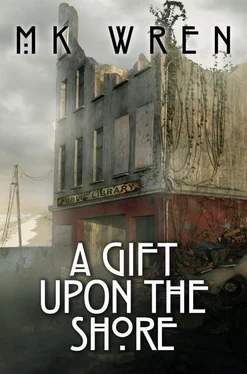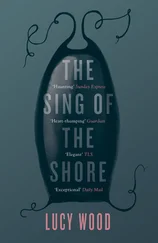But if the Rovers had spent their nihilistic passion here, maybe the rest of the town had been spared—and the Apie station.
Highway 101 was strewn with motionless vehicles given a semblance of movement by windblown snow. Rachel and Mary trudged southward, passing one burned building after another, and finally Mary couldn’t deny the bleak truth: nothing in the heart of Shiloh had escaped the fires. They skirted cars without looking into them. They drifted down a defile of blackened relics. And when they reached the Apie station, Mary gazed at its ruins with tears freezing on her cheeks. The riven steel of the antenna tower lay sprawled atop the rubble like the bones of a dinosaur.
So much for our link with the rest of the world, she thought. Harry Berden hadn’t gone home to Boise soon enough. She told herself that his body was probably buried in that snow white, fire black ruin, but she felt nothing she recognized as grief—not for Harry, not for her mother, not for anyone. All she felt was a keening desolation. She stood trembling, heart stuttering, and the pain seemed past bearing.
So much for hope.
At length, she looked at Rachel, saw the same despair in her eyes, but it was caged behind a stubborn resolve. Mary nodded. “It’s only been two weeks. The government, the army—someone will show up eventually. Besides, there must be survivors around here. We survived.”
Rachel shivered. “Yes. We survived.” Then she turned away and walked toward the ruins of the building that had housed Connie’s clinic, and for the next half hour they searched among treacherous avalanches of fallen boards and brick. They were rewarded for their efforts with three large bottles of antibiotic capsules, two of aspirin, another of alcohol, four rolls of gauze, a package of tape sutures, an assortment of disposable syringes, a scalpel, a pair of scissors, and a box of ten twenty-cc vials of morphine. Rachel put it all in a burlap sack.
We’re scavengers now, Mary thought, as they made their way through the debris to the highway where Silver and the dogs waited. This is how we’ll live. If we live. Like jackals at a carcass, we’ll live off the remains of a dead civilization. Her cold-numbed feet dragged, her fingers ached, and with every breath of chill air, she felt her internal temperature sink a fraction of a degree.
Rachel leaned wearily against Silver’s flank. “Mary, we’d better get home. Let’s head for the beach. The tide should be out, and it’ll be easier going that way.”
Mary wanted to object that they couldn’t go home yet. They hadn’t found any survivors. And there must be survivors in Shiloh. Somewhere. But she knew, as Rachel did, that if they didn’t get out of this enervating cold, they might not be able to count themselves among the survivors much longer. Tomorrow, the next day, they would, they must try again.
With the aid of a car fender, they mounted Silver and at the next cross street turned west. Burned houses marked the way, and Mary was convinced that the somber sentinels would continue all the way to the sea. It was then that she saw, emerging out of the fog of snow, an open area surrounded by trees and shrubs untouched by fire. The deep green of azalea and rhododendron leaves under the snow was pathetically bright, and in the midst of this unravaged island stood a church: an old, white clapboard, picture-postcard church. Mary stared at it, expecting it to disappear, a phantom of her hope.
But it didn’t disappear. It took on substance with Silver’s every step forward.
“Rachel, do you see it?”
“I see it. That’s the old Community Church.”
At the back of the building a brick chimney rose above the ridgepole. There was no smoke coming from it. And yet—Mary focused on the space above the chimney. Yes, a wavering of the tree branches behind it. Heat waves.
“The chimney! Rachel, there’s heat—a stove, something! Someone’s in there! This is where the survivors came!” She couldn’t wait for Silver’s slow gait to bring them closer. She slid off the mare’s back and ran toward the church, shouting, the dogs running with her, barking as if they shared her joy.
“Mary! Mary, wait !”
Mary didn’t hear Rachel, not until she caught up with her and grabbed her arm. “Mary, if there is anyone in there, we don’t know who it might be!”
With an effort, Mary tore her gaze away from the church to look at Rachel. “What?”
“We don’t know who’s in there. It could be Rovers.”
Mary took an aching breath. Rachel was right. She looked up at the chimney, at the wavering air above it. But someone was in there.
They walked slowly toward the church, Rachel ordering the dogs to heel, her rifle ready in her hands. Mary listened intently, but the only sound was the rasp of their breathing. They were thirty feet from the entrance when one of the double doors swung open.
Rachel snapped, “Mary, hold the dogs!” and stood with her rifle raised, aimed at the door.
Mary knelt and grasped Shadow and Sparky’s collars, stared at the door, at what came out of it.
A dog. A big, tawny dog, German shepherd in his lineage.
He was carrying something in his mouth. He gazed at them with amber eyes, a ridge of hair rising on his shoulders, and for seconds the tension was borne out in silence.
Until Mary recognized what the shepherd held in his mouth.
A hand. A human hand.
And she screamed.
As if that sound were a cue, six more dogs scrambled, snarling, out of the door. The shepherd dropped his burden, baring a serrated arsenal of teeth as he led the attack, snow exploding under his paws. Sparky and Shadow barked and lunged against their collars, but Mary held on when her only impulse was to run. She flinched at the crash of the rifle. Rachel only fired into the air, but the shepherd stopped, then bolted into the trees south of the church, his pack at his heels. Neither Sparky nor Shadow stopped barking until the last dog had disappeared.
Rachel knelt by Mary and said shakily, “You can let go of them now.”
Mary loosed her rigid hold on the dogs’ collars. “It’s like something out of a Russian folktale—the wolf pack chasing the troika.”
Rachel stroked Sparky’s head. “Dogs are only a few thousand years removed from wolves. They both survive by packing. Where’s Silver?”
Silver had retreated to the street, and Rachel had to go retrieve her. The mare wasn’t anxious to approach the church, nodding her head nervously and pulling at the reins. Mary waited for Rachel, then together they approached the door, but a few paces short of it stopped, and Mary stared at the hand in the snow. A cracked arm bone was attached to it, hung with black-red, frayed muscle. Meat. Mary felt a painful surge in her stomach.
Rachel only glanced at the hand. “The dogs were probably scavenging in the church. You won’t find anyone alive in there.”
“But the chimney, the heat…”
“Well, there’s the basement. The door is around at the back. Fellowship Hall, one of the hottest gambling spots in town.” Then when Mary looked at her blankly, she sighed. “Bingo. Mary, don’t you think if anyone was alive in there—”
“No! Fellowship Hall. That’s where they’ll be!” And Mary turned away from the doubt in Rachel’s eyes, set off around the side of the church, kicking through the drifted snow, only vaguely aware that Rachel was following her. At the back of the church under a portico, she found the entrance to Fellowship Hall. She pounded and yelled, jerked at the doorknob, and finally the ice that sealed the door gave way.
A landing, a short flight of stairs leading down into a pocket of dimness. “There’s another door, Rachel. Come on!”
Читать дальше












